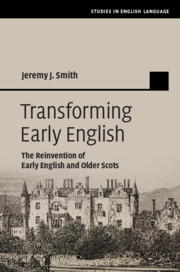Book contents
- Transforming Early English
- Studies in English Language
- Transforming Early English
- Copyright page
- Dedication
- Contents
- Preface
- A Note on the Transcriptions
- Introduction
- Chapter 1 On Historical Pragmatics
- Chapter 2 Inventing the Anglo-Saxons
- Chapter 3 ‘Witnesses Preordained by God’: The Reception of Middle English Religious Prose
- Chapter 4 The Great Tradition: Langland, Gower, Chaucer
- Chapter 5 Forging the Nation: Reworking Older Scottish Literature
- Chapter 6 On Textual Transformations: Walter Scott and Beyond
- Appendix of Plates
- Bibliography
- Index of Manuscripts and Early Prints
- Subject Index
Chapter 6 - On Textual Transformations: Walter Scott and Beyond
Published online by Cambridge University Press: 08 May 2020
- Transforming Early English
- Studies in English Language
- Transforming Early English
- Copyright page
- Dedication
- Contents
- Preface
- A Note on the Transcriptions
- Introduction
- Chapter 1 On Historical Pragmatics
- Chapter 2 Inventing the Anglo-Saxons
- Chapter 3 ‘Witnesses Preordained by God’: The Reception of Middle English Religious Prose
- Chapter 4 The Great Tradition: Langland, Gower, Chaucer
- Chapter 5 Forging the Nation: Reworking Older Scottish Literature
- Chapter 6 On Textual Transformations: Walter Scott and Beyond
- Appendix of Plates
- Bibliography
- Index of Manuscripts and Early Prints
- Subject Index
Summary
This book began with the case of Thomas Percy, and it seems therefore appropriate to conclude it with a figure who has a claim to be Percy’s principal successor as an imaginative recuperator of the medieval past, and whose presence will have been noted in several places earlier. In 1804, Walter Scott published his first edition of Sir Tristrem; a Metrical Romance of The Thirteenth Century; by Thomas of Erceldoune, called The Rhymer. Scott was not yet Sir Walter; nor was he yet the laird of the great estate of Abbotsford, which was still a farm nicknamed Clarty (i.e. ‘muddy’) Hole.
- Type
- Chapter
- Information
- Transforming Early EnglishThe Reinvention of Early English and Older Scots, pp. 215 - 238Publisher: Cambridge University PressPrint publication year: 2020

